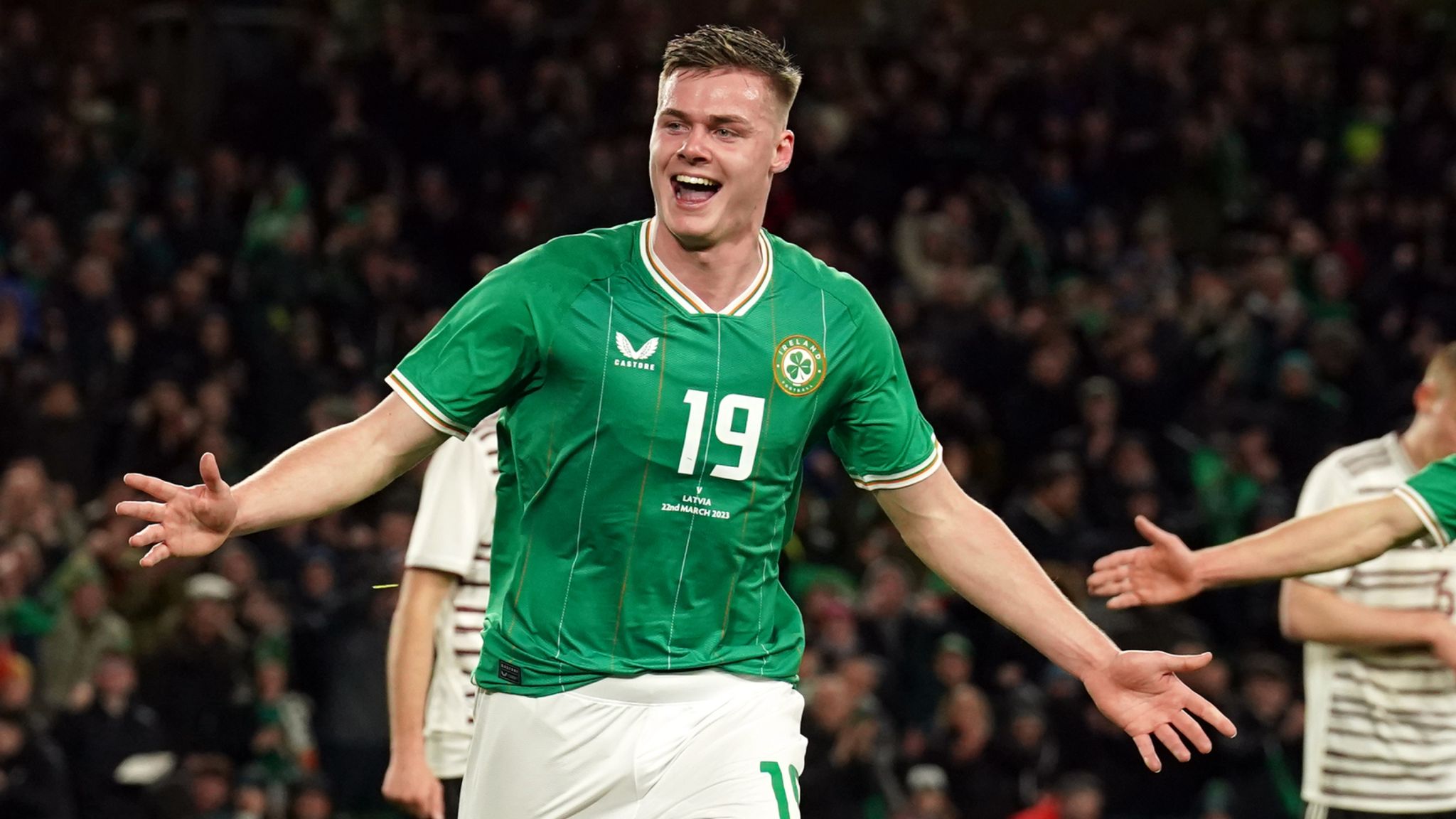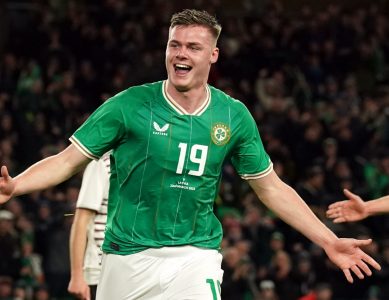Evan Ferguson has undergone a superb breakthrough season at Brighton at just 18-years-old; the Republic of Ireland forward has helped the Seagulls secure European football for the first time.
There was the sheer power of the first, then the speed and precision of the second.
As Brighton secured European football for the first time in the club’s history with help from two Evan Ferguson goals against Southampton on Sunday, there was a celebration for what will be, but also a tinge of regret for what could have been.
If the kid who could become king had not been unavailable for nearly a month through an ankle injury, the south coast club are confident they would have had Newcastle and Manchester United fretting over a Champions League spot, while reaching the FA Cup final at the expense of the latter.
At just 18, the impact Ferguson has had during his breakthrough season both on Brighton’s attack and opposition defences has been pronounced enough for some sharp minds in football to declare he could develop into a £100m player.
No one involved in the Republic of Ireland international’s formative years would mark that as hyperbole. Those working with Ferguson now believe we are being treated to a live showcase of a Premier League great in the making.
Is that too much expectation and pressure on a teenager? An unequivocal ‘no’ is the response from those who know him best.
The early years
Karl Lambe first encountered Ferguson as a six-year-old at the prestigious St Kevin’s Football Club in Dublin. “He first told me at eight that he wanted to play in the Premier League, and he said it with conviction,” Lambe said.
“From then, he’d hit every milestone with such focus like he was on this journey to get there, a map he’d drawn in his head.
“They probably seem quite insignificant now when you’re talking about the bigger scheme of scoring and playing in the Premier League or representing Ireland, but for example: when we were U8s he scored five goals to win the league.
“There was a newspaper heading of ‘Evan sent’ and he kept delivering. There was an U11 cup final that was his favourite game where he scored four and set up one. We’d go on tour and face the likes of Barcelona who had players that already had millions of followers on social media and a huge reputation, but he was the standout. He has never been out of place on a football pitch.”
Neil Fox, who worked with Ferguson at St Kevin’s and at youth level for Ireland, chimes in: “I can’t remember how long we were saying ‘he’s something else. He’s something really special’ for.”
When did that feeling reach the outside world? “We played Barcelona home and away plus a bunch of top Europeans so in the school football bubble with academy scouts it was no secret how big the potential was,” Lambe says.
“We played Manchester United at Carrington and he scored twice for the U10s. They hammered us but he scored the two goals and people were starting to fully pay attention to him when we came back to Dublin. A few months later, the scouts from the big English clubs used to regularly attend our games.
“But at 14 when he was still here as a schoolboy, Bohemians called him to represent their first team against Chelsea and that’s when it really took off. He came on and he was so direct, the dribbling, the dummies, brushing off experienced Premier League defenders.
“I’d assume Chelsea didn’t know that he was just 14 when he was coming on and they treated him like any normal player.”
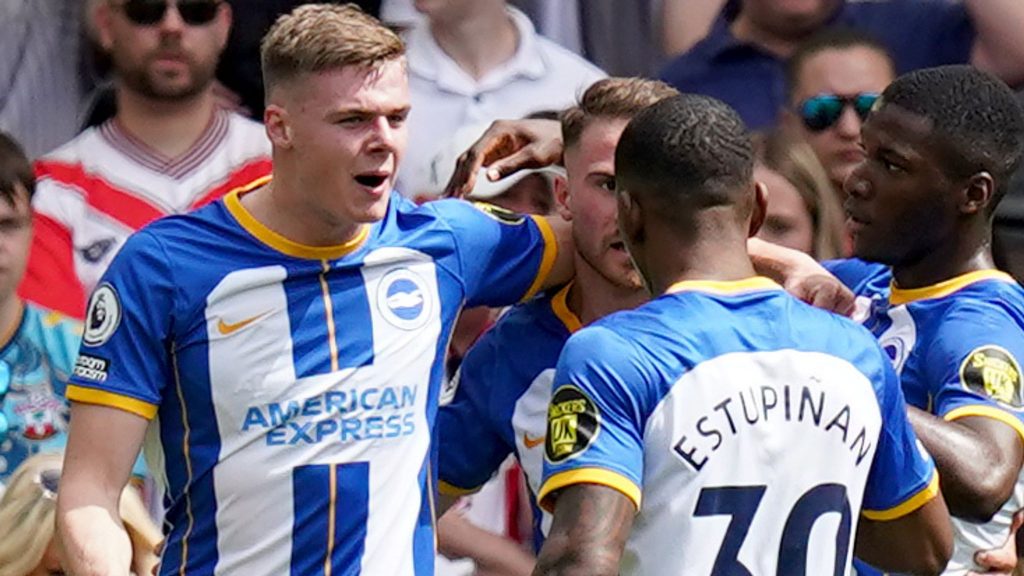
Ferguson had been displaying traits that belie his age long before he was exposed to a greater media glare in that friendly, which was Frank Lampard’s first match in charge of Chelsea.
“I go back to U8s where most kids get a ball and just wanna run to the goal and score,” Lambe says. “And obviously Evan was really good so he could do that, but he had great decision-making, even at a young age. You see it now with Brighton and how he’s running in behind sometimes, sometimes he’s dropping into space. He had that game intelligence and game understanding from as young as I can remember. He wasn’t like a normal kid who’d just run around without purpose with the ball.”
A complete player
One of Ferguson’s great strengths has been the variety in his game, stemming from learning different positions in his formative years with a special focus on midfield.
“We were losing 5-0 to Barca once after 10 minutes and I put him at centre-back to stop the goals and he did,” Lambe says. “We didn’t want to make a habit of that and I would say from around 12 he started to gravitate to being a forward that could also work as a playmaker.
“We played in an all-Ireland final at U14s, and as the teams were walking out to the pitch, one of the lads pulled up. I told Evan, ‘you’re playing midfield’ as he was about to take to the pitch and he was man of the match!”
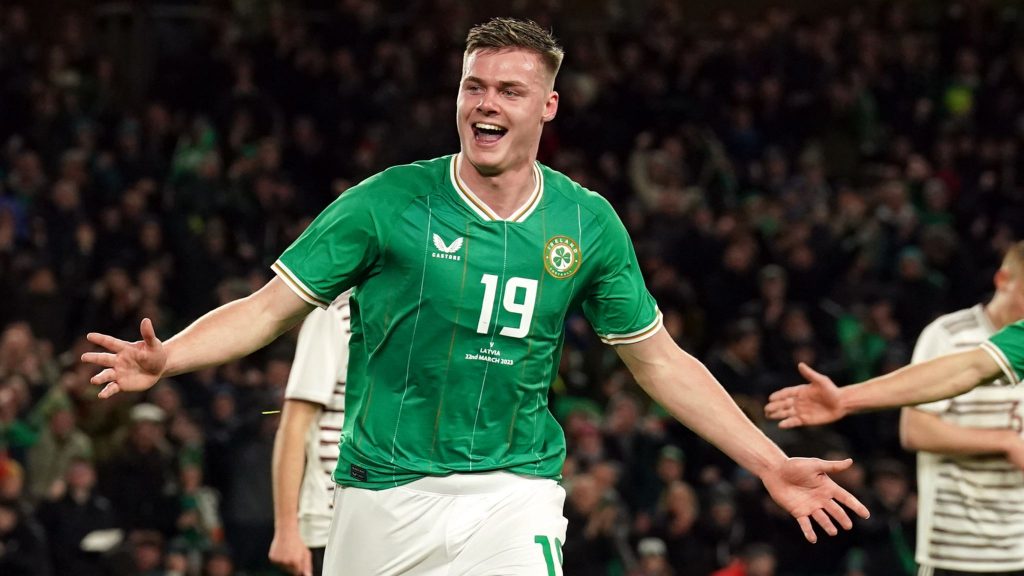
Ferguson’s link-up play and passing vision certainly screams of someone who has the ability to read the game as a midfielder
“I think it’s helped me sort of just be more natural as a modern striker,” the teenager said. “You see strikers now, like Harry Kane, the way they drop in… I wouldn’t be surprised if he played midfield as a kid.
“I can understand the kind of run to make or when to delay a pass. It’s helped me be more complete.”
Brighton manager Roberto De Zerbi emphasises Ferguson is “not a normal 18-year-old” given his physical development, but also his technical brilliance.
“He’s already a great player,” the Italian declares. “I think he will become one of the best players, the best strikers in the Premier League.”
De Zerbi has been impressed by how quickly Ferguson absorbs his tactical demands and how efficiently he has been able to implement them.
There is not a goal he cannot score: outpacing and bullying William Saliba before waiting for Aaron Ramsdale to dive and slotting underneath him, the touch, turn and finish against Grimsby in the FA Cup, towering headers and accurate low finishes.
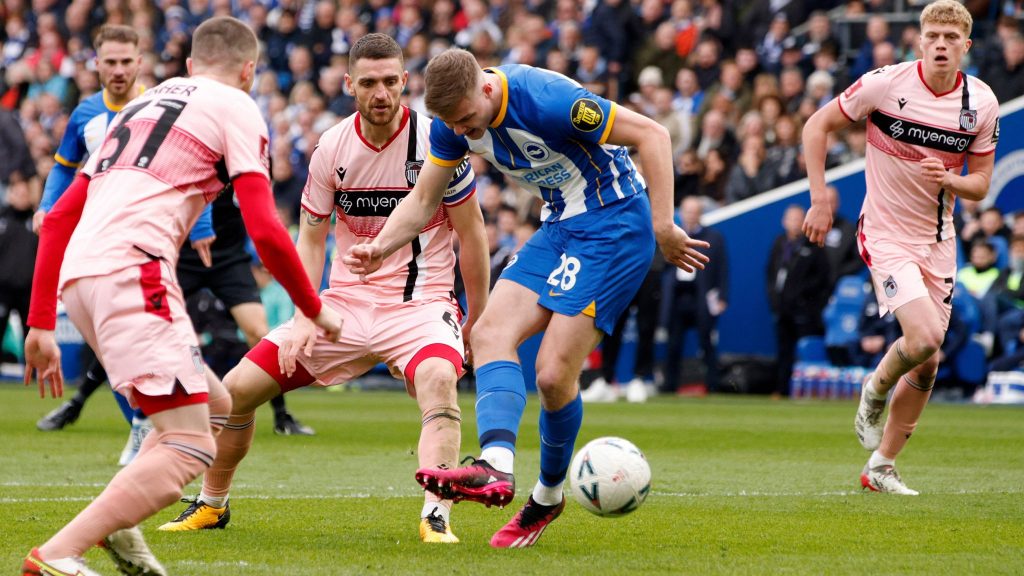
“He’s a footballer,” Lambe says. “He’s quite big, tall and strong but he’s not a flick-it-on type or a traditional target man. There is nothing lacking technically in his game. He can play!”
Despite being physically superior to opponents as a kid, Ferguson opted to use skill over his size. “The Everton game in January he got a yellow card for a foul to halt play. That’s the first time I’ve ever seen Evan get involved in anything like that,” Lambe says.
“So even though he was big, he never got involved in bullying people or using that physicality. We actually used to say to him you ‘could use that a bit more’, but he never.
“He constantly relied on his game and football ability,” Cox adds. “He was never the type to be flying into tackles and dominating matches physically, he would be the best player on the pitch by reading the game better than everybody else.”
Brighton strike gold
Ferguson had been on trial with Liverpool, Manchester United, Everton and Celtic, but it was Brighton who detailed a clear pathway to the first team. Their academy manager, John Morling, had the inside track on Ferguson, having worked for the FAI with his father Barry prior to joining the Seagulls.
Having followed developments at St Kevin’s and Bohemians, he was convinced the boy could shine among men.
Mark Beard, Brighton’s U18s coach at the time, thought it was silly to chuck a 14-year-old into training with his group, but he said: “Evan quickly was the standout player in every session. The first team would catch glimpses and ask about him.”
Brighton reached a gentleman’s agreement with Ferguson’s family that he would join them when he officially could at 16 – on account of his mother Sarah’s English heritage that sidestepped Brexit rules.
“When you look at the overall picture, when you get invited to go to Liverpool and Man Utd, it’s such a huge thing. Those clubs are as big as you can get in Ireland,” Cox says. “But I think it shows where his head was in that he didn’t care about the status or the headlines or the money that comes from making that kind of move.
“He signed for Brighton because he was looking at his career and saying ‘I’m gonna work my way up here and I’m gonna be seen and I’m gonna get a chance’. And no disrespect to obviously the bigger clubs, but we’d all agree he’s made the right decision to go to Brighton.
“He’ll achieve everything he is destined do because his head and heart is in the right place over becoming the finest footballer he can be.
“Evan has been exposed to hype, responsibility and expectation before he turned 10 and he takes everything in his stride because he has an amazing support system in his parents. They’ve never pushed or forced him to do anything or got too involved or pressurised his development.
“There are nightmare parents in schoolboy football but they were a dream. He gets that calm sense from them. Evan can go on and become that £100m player being talked about, but it won’t change who and how he is – that’s a credit to him and his family.”

